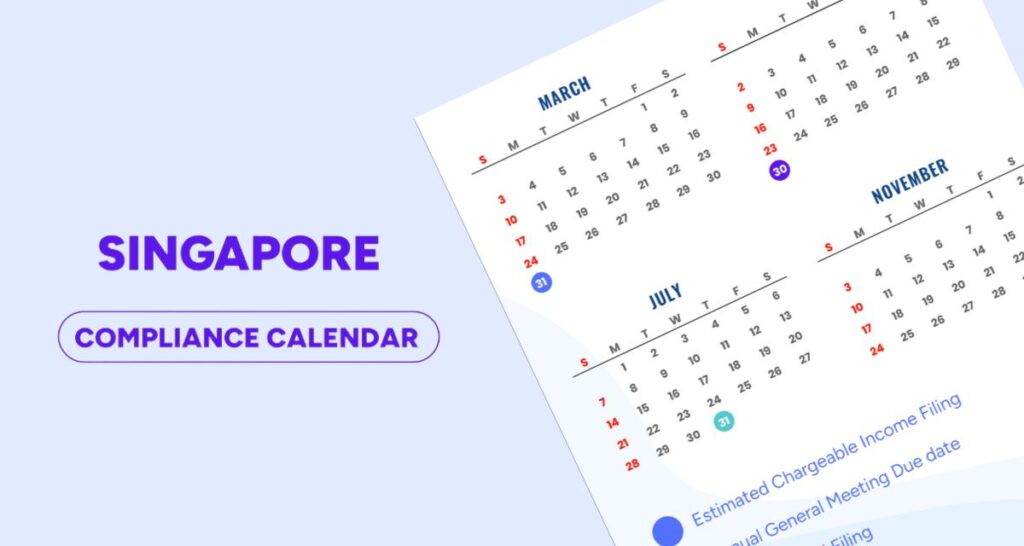Ever heard of the saying “When you fail to plan, you plan to fail”? Planning ahead has never been an easy task. In the bustling city of Singapore, where managing multiple tasks and projects at the same time is a norm, staying on top of important dates becomes challenging when you already have a long list of priorities.
As a business, it is imperative to always gear up for busy seasons and ensure you have the necessary resources to achieve your highest sales. Adhering to key compliance deadlines is important because failing to meet regulations can result in significant penalties for non-compliance.
In this article, we will provide a simplified summary to help you easily keep track of important compliance deadlines in Singapore:
- Corporate compliance deadlines in Singapore
- What are the common penalties for non-compliance?
- What is a Compliance Calendar?
- Why is Compliance Calendar important?
- MBiA’s Singapore Compliance Calendar
Corporate compliance deadlines in Singapore
Success in Singapore requires understanding and adhering to their established regulations. To stay on track with regulations and keep things running smoothly, there are some key deadlines all corporations need to be aware of. Here is a breakdown of these essential compliance deadlines:
Holding Annual General Meeting (AGM)
All companies (except private dormant companies) must hold an Annual General Meeting (AGM) with shareholders within 6 months after their financial year end (FYE). However, there are some AGM exemptions that companies can get:
- Private companies can skip the AGM if they send their financial statements to shareholders within 5 months of FYE.
- However, the exemption does not cover cases where shareholders request an AGM within 14 days before the end of the sixth month after FYE.
Filing Annual Returns with ACRA
The date on which your business is required to file Annual Returns is any time within:
- For non-listed companies: 7 months after the FYE
- For listed companies: 5 months after the FYE
In addition, there is also a secondary factor to consider when filing Annual Returns, which is shareholder approval. Regardless of listing status, you can also file your annual returns one month after the date your shareholders approve the company’s financial statements. This can be a helpful option if your shareholder meeting falls a bit later in the year, but it is important to ensure both the meeting and filing occur within the designated timeframe.
File Estimated Chargeable Income (ECI)
Estimated Chargeable Income (ECI) is an estimate of a company’s taxable profits after deducting allowable expenses. Companies that don’t meet exemption criteria must report their ECI to the Inland Revenue Authority of Singapore (IRAS) within 3 months of their financial year-end. Companies typically receive a notification from IRAS to file their ECI in the last month of the financial year. This reporting requirement ensures companies estimate and remit their tax obligations in a timely manner.
Corporate tax return filing for previous YA (Form C-S/C)
Form C-S/C is the tax declaration form companies in Singapore must use to report their income to the IRAS. Companies are required to file either the shorter Form C-S or the more detailed Form C, depending on their revenue and eligibility for the simplified filing option.
The government introduced Form C-S to streamline the tax filing process, particularly for smaller companies. Starting on YA 2021, the deadline for filing Form C-S/C is 30th November of the year following the financial year.
IR8A filing/AIS submission
Form IR8A, also called the Return of Employee’s Remuneration, is a mandatory document that employers must submit to the IRAS on an annual basis to report the annual earnings of their employees. IR8A must be submitted to IRAS by 1st March following the end of the calendar year for which income is being reported. Failing to submit before the deadline may lead to fines under Section 94 of the Income Tax Act.
Auto Inclusion Scheme (AIS) is an arrangement by the Inland Revenue Authority of Singapore (IRAS) that allows employers to submit the income details of their employees electronically to a centralized digital platform. By automatically incorporating the information submitted by companies or employers through AI, this scheme aims to simplify income tax calculations for employees in Singapore As an employer, you must prepare all the employment income information, and submit the information using AIS software by March 1st.
For a quick overview of key compliance deadlines specific to non-listed companies, take a look at the following table:
| Compliance Task | Deadline |
| Holding Annual General Meeting (AGM) | Within 6 months after the FYE, unless exempted |
| Filling Annual Return | Within 7 months after FYE |
| Filing Estimated Chargeable Income (ECI) | Within 3 months after FYE |
| Filing Corporate Tax Return (Form C-S/ C) | By 30th November annually |
| IR8A filing/AIS submission | By 1st March annually |
What are the common penalties for non-compliance?
Failure to adhere to these regulations can result in significant consequences, impacting both the organization’s financial health and its reputation. Understanding the common penalties for non-compliance is essential for employers to proactively manage their obligations:
| Type of breach | Penalties amount (SGD) |
| Holding the AGM late | Late lodgement fee of S$300 if the return is lodged within 3 months of the deadline for filing annual returns |
| Not holding the AGM | Directors can be prosecuted in court, eventual consequences can include disqualification or debarment from being a director |
| The AR is lodged late | Late lodgement fee of S$300 (for late lodgement filed within 3 months after filing due date) Late lodgement fee of S$600 (for late lodgement filed more than 3 months after filing due date) |
| Late lodgement fees (other than late lodgement of annual return) | Ranges between S$50 to S$350 (depending on the number of days late) |
| Late or non-filing of corporate income tax returns | If the filing for any year of assessment is outstanding for 2 years or more, the penalty could be twice the assessed tax amount plus a fine of up to S$1,000. |
| Late filing ECI | Receive a Notice of Assessment that may be issued based on an estimation of your company’s income (for late lodgement filed within 3 months after FYE) Companies must pay the assessed amount within one month of receiving the NOA, with no instalment payment options. |
| IR8A filing/AIS submission | The company can be subject to a fine of up to S$5,000 for late AIS submission |
Keeping track of compliance deadlines requires investing significant time and resources. To optimize workflow and avoid resource strain, it is essential to make use of effective supporting tools. Among these, a compliance calendar can be a game-changer for your business.
What is a compliance calendar?
A compliance calendar is a critical tool that keeps track of all your important business obligations, deadlines, and regulations. It helps you ensure your company has all the information you need and file everything on time to avoid any fines or penalties due to missing information or late filings.
Why is compliance calendar important?
- Increase transparency: A compliance calendar enables effortless progress tracking, keeping stakeholders well-informed and reducing compliance uncertainty.
- Improve efficiency: Compliance calendars streamline recurring task fulfillment by storing key details (instructions, past learnings, required documents,…), which simplifies revisiting tasks and delegation.
- Circulate compliance information throughout the organization: Proactive management of regulations allows for planning, data gathering, resource allocation, and employee education, reducing non-compliance risks,…
- Circulate compliance information throughout the organization: Proactive management of regulations allows for planning, data gathering, resource allocation, and employee education, reducing non-compliance risks,…
- Take a proactive stance on regulatory measures: Compliance calendars allow organizations to plan ahead for compliance needs, rather than reactively addressing issues as they arise.
Compliance calendars play a pivotal role in managing legal requirements and ensuring regulatory compliance. An effective compliance program can bolster and reinforce your company’s values and desired culture.
MBiA’s Singapore compliance calendar
To assist busy business owners in navigating their compliance requirements, we’ve crafted a detailed and concise checklist of crucial due dates. This calendar visualizes a representation of all important compliance deadlines, offering a big picture of financial operation guidelines for businesses.

The calendar covers the 5 most crucial corporate compliance deadlines (AGM, ECI, Annual Returns, Corporate Tax Return, IR8A filing/AIS submission).
It is designed for companies with 4 different financial year-ends on 31st December, 30th June, 30th September, and 31st March.
FAQs
1. What should I do before beginning my annual tax filings?
You can’t accurately do your annual tax filings without first completing some important preparatory tasks:
- Keep a complete record of sales income and operating expenses: Bookkeepers are responsible for regularly “balancing” the books , ensuring that debits and credits in the accounts are equal. If these numbers do not align, it is necessary to review past documentation to detect any inconsistencies, miscalculations, or other errors, and complete the process again.
- Account for employee costs during the year: Companies calculate employee costs by adding up all relevant costs associated with an employee throughout the year and dividing the sum into an annual, monthly, or hourly rate. The costs largely include gross salary and employer payroll contributions.
- Confirm the amount due from customers and the amount due to suppliers: This involves reviewing invoices, payment records, and outstanding balances to ensure all accounts receivable and accounts payable are accurately reported.
- Ensure accurate inventory management: Make sure your inventory records are precise and up-to-date. This includes raw materials, work-in-progress, and finished goods. Regular inventory counts and valuations help provide an accurate picture of your assets, which is essential for both financial reporting and tax purposes.
2. Which financial statements do I need to prepare?
Every company must submit annual financial statements in accordance with the Financial Reporting Standards of Singapore, unless they are exempted. These statements typically include:
- Profit and Loss Statement: The Statement of Comprehensive Income provides a summary of your company’s total revenue and expenses for the financial year. It indicates whether your company made a profit or incurred a loss, detailing the key drivers behind these financial outcomes.
- Balance Sheet: The balance sheet lists all your company’s assets, liabilities, and stockholder equity. It is essentially a measure of your firm’s net worth and long-term financial health.
- Cash Flow: This document lists your firm’s cash inflows and outflows and shows if you’re generating enough cash from business activities to fund your daily operations.
- Statement of Changes in Equity: The Statement of Changes in Equity informs you about changes in the beginning and ending balances of your company’s equity during the financial year.
3. Do My Financial Statements Have to Be Audited?
Your company, at consolidated level is required to have its financial statements audited if it meets any two of the following conditions:
- Your total annual revenue exceeds S$10 million
- Your total assets are greater than S$10 million
- Your company has more than 50 employees
4. Can tax exemptions be carried forward to subsequent years if there is no profit in the first 3 years?
No. If during any of the first three tax years, your company incurs losses or it has no income (e.g. business has not commenced), your chargeable income and tax payable will be zero. Therefore, the company cannot benefit from the tax exemption scheme for new start-ups for that tax year. However, that particular tax year will still be included in determining the first three consecutive tax years.
5. What if I disagree with the Notice of Assessment issued by the Inland Revenue Authority of Singapore (IRAS) for my company?
The company must file an objection to the IRAS within 2 months from the date of the Notice of Assessment. If no objection is received within that period, the assessment will be treated as final.
6. For how long can the company’s losses be carried forward?
If your company experiences business losses in a tax year and these adjusted losses exceed its other sources of income, or if there are no other sources of income to offset the trade losses, you will have unutilized losses (unutilised capital allowances, trade losses and donations) for that tax year. These unutilized losses can be carried forward to offset against your company’s taxable income in future tax years, provided the company passes the Shareholding Test. This test requires that there be no significant changes in the company’s shareholders and their shareholdings as of the relevant dates determined by the authorities. Unutilised capital allowances can only be applied to future income if the company remains operating in the same trade or business for which the allowances were originally given.


